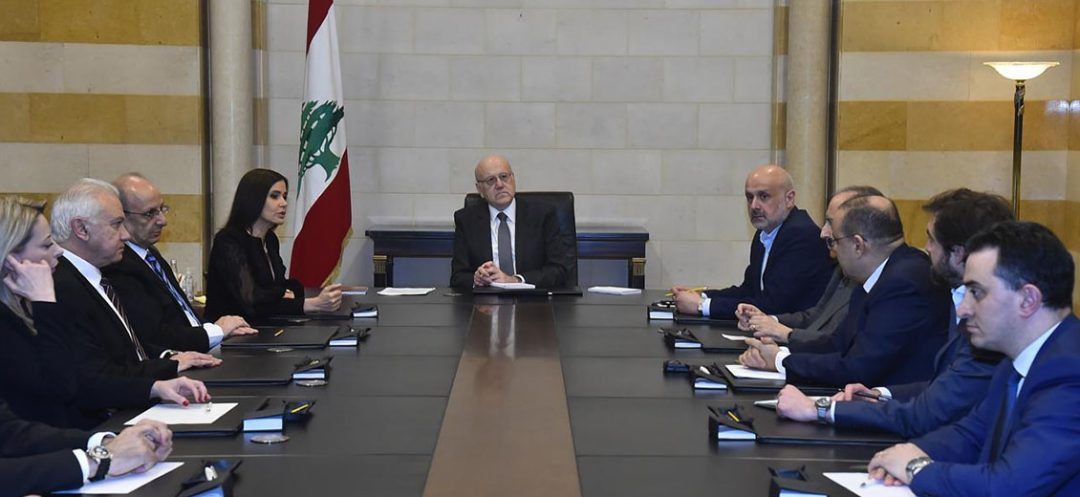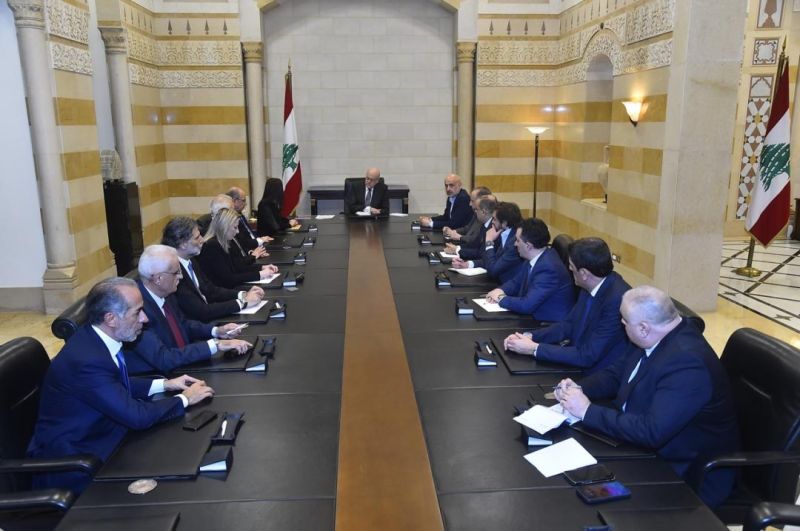
Caretaker Prime Minister Najib Mikati held two meetings on Monday at the Grand Serail, both focusing on the Syrian refugee crisis.
The first meeting was attended by Caretaker Minister of Interior and Municipalities Judge Bassam Mawlawi, Acting Director of General Security Elias Baissari, UN Resident and Humanitarian Coordinator for Lebanon Imran Riza, and the United Nations High Commissioner for Refugees (UNHCR) Representative in Lebanon, Ivo Freijsen. Discussions during this session primarily focused on Lebanon's collaboration with UNHCR, aiming to create collaborative strategies to tackle the multifaceted challenges associated with the refugee crisis. Additionally, Lebanon is considering potential repatriation of Syrian nationals who have served sentences in Lebanese prisons.
Subsequently, Prime Minister Mikati received a delegation from the Lebanese Forces parliamentary bloc, led by MP Sethrida Geagea. The delegation, alongside Mawlawi and General Baissari, engaged in discussions concerning the issue of the illegal Syrian presence in Lebanon.
A statement issued by Geagea's office emphasized that "Lebanon is a transit country and not a refuge country at all." It acknowledged the efforts of municipalities within the bloc's active areas in managing this presence. “However, this alone is not sufficient, and it is the responsibility of the security forces and the General Security to play their central and essential role in this matter,” the statement read.
The delegation urged Mikati to provide clear directives to the Ministers of Interior and Defense, aimed at enforcing Lebanese laws concerning illegal foreigners within the nation's borders.
These meetings precede the anticipated arrival on Thursday of the Head of the European Commission, Ursula von der Leyen, and Cypriot President Nikos Christodoulides.
Cyprus is pressing Beirut for a resolution to the persistent influx of Syrian migrants from Lebanon. Christodoulides previously visited Beirut on April 16 to appeal to Lebanese authorities for enhanced control over maritime borders. The latter sought Nicosia's intervention with the European Union for a comprehensive solution to the Syrian presence issue, akin to agreements already established with certain host countries.

The first meeting was attended by Caretaker Minister of Interior and Municipalities Judge Bassam Mawlawi, Acting Director of General Security Elias Baissari, UN Resident and Humanitarian Coordinator for Lebanon Imran Riza, and the United Nations High Commissioner for Refugees (UNHCR) Representative in Lebanon, Ivo Freijsen. Discussions during this session primarily focused on Lebanon's collaboration with UNHCR, aiming to create collaborative strategies to tackle the multifaceted challenges associated with the refugee crisis. Additionally, Lebanon is considering potential repatriation of Syrian nationals who have served sentences in Lebanese prisons.
Subsequently, Prime Minister Mikati received a delegation from the Lebanese Forces parliamentary bloc, led by MP Sethrida Geagea. The delegation, alongside Mawlawi and General Baissari, engaged in discussions concerning the issue of the illegal Syrian presence in Lebanon.
A statement issued by Geagea's office emphasized that "Lebanon is a transit country and not a refuge country at all." It acknowledged the efforts of municipalities within the bloc's active areas in managing this presence. “However, this alone is not sufficient, and it is the responsibility of the security forces and the General Security to play their central and essential role in this matter,” the statement read.
The delegation urged Mikati to provide clear directives to the Ministers of Interior and Defense, aimed at enforcing Lebanese laws concerning illegal foreigners within the nation's borders.
These meetings precede the anticipated arrival on Thursday of the Head of the European Commission, Ursula von der Leyen, and Cypriot President Nikos Christodoulides.
Cyprus is pressing Beirut for a resolution to the persistent influx of Syrian migrants from Lebanon. Christodoulides previously visited Beirut on April 16 to appeal to Lebanese authorities for enhanced control over maritime borders. The latter sought Nicosia's intervention with the European Union for a comprehensive solution to the Syrian presence issue, akin to agreements already established with certain host countries.

Read more



Comments